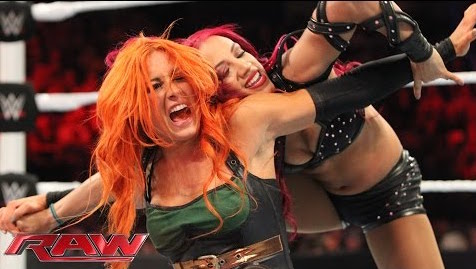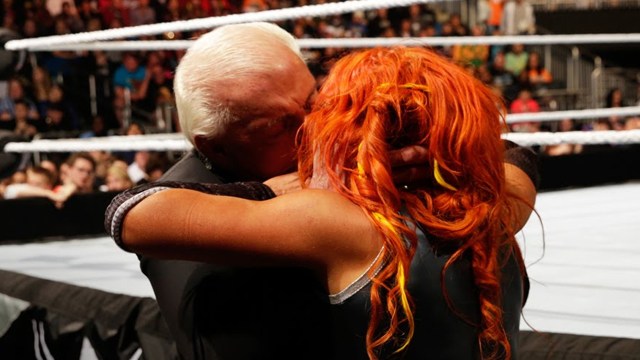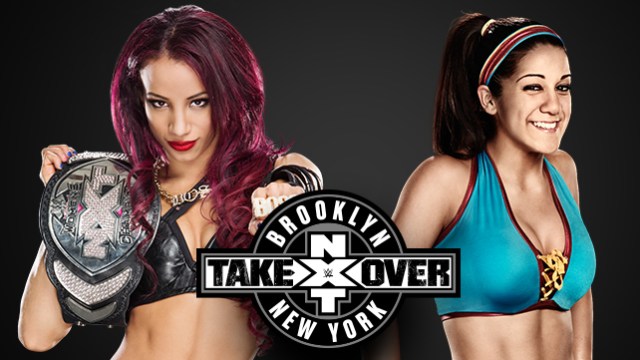Stolen Kiss During WWE Divas Match Showcases Disrespect to Women Athletes

Once a month on Sunday nights, my living room gets a little loud. My friends and I grab some snacks and turn on the WWE Network for a night of unadulterated wrestling madness. This January, we got to watch a historic Royal Rumble pay-per-view, in which thirty men battled it out in the very first Royal Rumble match where the winner would be crowned the WWE World Heavyweight Champion. Spoilers ahead: The night saw the unseating of champion Roman Reigns in favor of one of the heads of the WWE’s corporate side and long-time wrestling legend, Triple H, and whether you’re a fan of the outcome of the Rumble or not, it was a great display of sports entertainment.
That said, there was a sour note to the evening, and it came during the Divas Championship Match. In case you don’t watch pro wrestling, Divas are what the WWE has branded their women wrestlers. The current champion is Charlotte, daughter of the wrestling legend Ric Flair, and at the Royal Rumble, she was set to face off against her former best friend, Becky Lynch. In the fiction of the WWE Universe, Becky is the scrappy steampunk-wearing Irish Lass-Kicker and a fan favorite who came up with Charlotte from their time in WWE’s developmental program, NXT. So, when Charlotte became champion and got a little swelled head, it was Becky who challenged her for a chance at the gold.
It was set to be a hell of a great match. Ric Flair was out there in his daughter’s corner, so it was no surprise when he got involved with the match to distract Becky. It’s tradition for anyone ringside to try to help out their ally, or in this case, their daughter. I was expecting pretty much anything from the wily ol’ Nature Boy Ric Flair.
What I didn’t expect was for Flair to grab Becky Lynch and steal a sloppy, disgusting kiss.
In the kayfabe (read: the fiction created by the WWE), Ric Flair is a wheelin’, dealin’, kiss stealin’ old man. It’s been part of his persona since he was a wily young man, but watching this 66-year-old man grab a girl to kiss her against her will during a match, in front of his own daughter and the world, I got this sense that whatever charm Ric Flair may have ever had wore off. Some people in the audience laughed, many jeered, but underneath was a serious undercurrent and anger at the disrespect paid to Becky Lynch, a hard-working young woman and athlete.
But then, why are we surprised? Disrespectful behavior towards women has sadly been a matter of course on WWE programming. Just the next night on Monday Night Raw, the WWE Universe went bananas when former WWE Superstar and now film star Dwayne “The Rock” Johnson showed up to promote the upcoming Wrestlemania, and while it was amazing to see the Rock again, his promo involved the live cameras following him while he cornered Lana, valet and fiancé to WWE Superstar Rusev, to remind her about a supposed torrid night they had together. While the Rock wink-winked and joked about all the “exercises” Lana showed him, I couldn’t help but wonder what the hell this supposedly added to the programming except to remind us exactly where women fit in the WWE Universe.
In one night, we’d been presented with all the archetypical favorites for the WWE: conniving, power-hungry daddy’s girl Stephanie McMahon; leggy, nearly silent arm candy Lana; the Total Divas reality stars on parade; and the spoiled brat champion, Charlotte. We were presented with all the greatest sexist stereotypes of women, pushed onto athletes who frankly deserve a lot better. Oh and let’s not forget the Rock calling wrestler Big E a woman as a matter of insult. Because, you know, being called a woman is an easy insult to make any man angry. It was just another Monday Night Raw.
As a woman and a rabid WWE fan, I used to believe in the Divas division. Earlier in 2015, when Paige was brought into the WWE from their developmental programming on NXT, I believed that the WWE really was interested in creating a Divas Revolution. I believed they wanted to see the WWE develop a serious women’s division, the way that NXT had. NXT didn’t just give their women talent a chance to wrestle—they made the women into main event headliners. Women wrestlers like Baylee and Sasha Banks headlined pay per views as the main even. Women like Asuka showed what different fighting styles from around the world could bring, while Nia Jax was a powerful plus size wrestler who audiences embraced. The women of NXT are powerful, strong, fast, and talented. They also have integrity, and so does the NXT women’s division—something that seems to be sorely lacking when dealing with the Divas division in the WWE.
The trouble, of course, is that it’s not the Divas themselves that are to blame, but the creative team behind the kayfabe. The fiction of the Divas division seems to be trapped in a time when audiences expected to see their women athletes as two-dimensional sex objects, trapped in hackneyed storylines that were already getting old in the ’90s. The catty, backstabbing, shrieking storylines about betraying BFFs and stealing someone’s man went out with hair-pulling and bikini matches, or at least they should have. Instead, we have Ric Flare grabbing a young woman and stealing a non-consensual kiss in middle of a championship match.
The level to which that one moment disrespected an athlete like Becky Lynch cannot be understated. She’s a seasoned athlete, a talented and much loved performer. She deserved the same respect offered any championship contender. Whether or not Becky signed off on the kiss as part of the kayfabe for that evening, that moment was a reminder that in the fiction of the WWE universe, a woman athlete can be manhandled by a man, sexually, for laughs. That moment told the audience that she isn’t an athlete to be respected, but rather a woman who had her space and her body pawed by an old man in a suit. Besides being gross to watch, the moment reduced these two women athletes to the playthings of an old man’s whim, an old man manipulating his daughter and manhandling her opponent. Whatever power those women had in that moment was erased with one sloppy kiss, played up for laughs.
And millions of WWE fans across the world saw it happen, because it was scripted, and because it was live.
I’ve been a wrestling fan since I was a little girl. When I was only six or seven, I would sneak over to my neighbor’s house, where she was allowed to watch WWE back in the days of Hulk Hogan, the Macho Man Randy Savage, and Brett “The Hitman” Hart. I fell in love with the lights and the fights, the high-flying action and the over-the-top announcing. It seemed like a world where anything was possible.
That is, unless you were a woman.
See, I’ve kept up with pro wrestling since my childhood, which means I’ve watched twenty five years of sports entertainment go by. I was watching when Alundra Blayze, the WWE Women’s Champion, appeared on WCW, only to toss the WWE belt into a garbage can. That one moment shot what upwards momentum women had as wrestlers in the leg for decades to come. I watched as women like Sable, Chyna, Trish Stratus, Lita, and AJ Lee all struggled against the same glass ceiling that held them in place. Most of them carved out their place in WWE history but were only allowed to go where the male-created, male-dominated creative divisions would let them. They were given their own division, but they aren’t Superstars like their male counterparts. No, they are Divas.
Instead of fighting for a women’s championship, the women athletes of the WWE instead battle for a pink, butterfly-shaped belt for the chance to be called the Divas champion. These women are not women wrestlers in the WWE, but Divas. The name not only perpetuates the separation between the women athletes and their male counterparts, but sets the tone for the type of entertainment you expect to see when the Divas are on screen. The men get to be Superstars and fight for the glory of championship belts. The women get to fight over their Barbie-pink butterfly belt, scream catty insults at one another, then work as hard as their male counterparts to put on some stunning matches that the audience inevitably doesn’t respect enough, before they disappear for a while to tape a season of the WWE’s painful reality show, Total Divas.
So really, in the long run, a totally inappropriate stolen kiss is just the tip of the iceberg.
When discussing the future of women’s wrestling, a few arguments get put up as to why the WWE has stalled on their “Divas Revolution.” One major argument says that fans just won’t take women’s wrestling seriously, citing how badly the audience often reacts to Divas matches. That argument doesn’t hold much water if one looks at the amazing support the NXT Women’s Division has gotten over the last few years. It’s clear that not only will audiences cheer for women’s matches when they’re presented well, but will show up in droves for women headlining a PPV. It’s all based on whether or not the women are given proper treatment by the show’s fiction and whether the show gives the audience the cues that say these women should be taken seriously.
The second argument is more difficult to overcome: The WWE is a publicly traded, multi-billion dollar entity, goes the argument. Should they try to showcase women fighting in a more serious manner—or even more unthinkable, women fighting men—they’ll face potential backlash from both conservative and liberal groups. The WWE has been trying to aim more towards family-friendly entertainment, and in a world where discussions about domestic violence and violence against women is a major and important topic, having a show that allows women to get beaten up by men would be a deadly blow to the company’s reputation and their bottom line. This argument does hold a lot of water. The transition over to allowing women to fight more prominently would require careful handling and a lot of public discussion over the place of women fighters in sports altogether. It’s a conversation Ronda Rousey faced when people started asking if she’d fight male opponents, too. Women fighting women is controversial enough, but to see a woman get punched in the face or knocked to the ground by men would apparently be too much for (largely male) audiences.
Meanwhile, other wrestling promotions have caught on that the twenty-first century means a change for their women performers. Shows like Lucha Underground on the El Rey Network not only allow women to have their own impressive matches, but they fight against male competitors in singles and mixed tag team competitions. Women like Sexy Star own their sex appeal and then compete on the same level as their male counterparts with ease.
Across the world, in places like Japan, women fighters are considered powerful and well-respected athletes. In smaller promotions across the US, women wrestlers like the awesome Jessicka Havok enter the ring against men and put on great shows. There’s even a women’s wrestling promotion known as Shimmer, where women fight one another and draw a large following. These promotions have learned what the WWE seems to be resisting: that women have a place alongside male competitors and deserve to be given bookings and storylines that respect them as the athletes they are. Though these companies are smaller promotions with less to lose than the WWE, if the biggest promotion in the world can’t get behind these changes, then progress may be dead in the water.
Looking at the whole state of women’s wrestling and the WWE, it’s no surprise that the Becky Lynch kiss, the off-color comments about Miz wearing a dress, or the ones about Big E being a woman happen. Creatively, the treatment of women in the WWE is stuck in the dark ages of the ’80s and ’90s. While fans have become savvier and more aware of the ways kayfabe is crafted, the creative team seems to have fallen back on antiquated and sexist tropes that pander to the lowest common denominator. So who’s to blame when the audience shouts out lewd comments about the women athletes during matches, or else chant, “Boring!” when the women are busy putting on a good show. They’re used to the kayfabe disrespecting the Divas one moment and then touting them as women athletes the next. They’re not sure whether they’ll get a great match or the next salacious joke or non-consensual kiss. This is what audiences have been presented, and the writers seem to be pandering to that crass representation of its Divas, while more savvy fans—many of whom are women!—sit back and cringe.
Who knows. Maybe there’s a chance we’ll see a change. Maybe that Divas Revolution will instead rise up and finally become a true Women’s Revolution. Maybe we’ll see a Women’s Championship belt in the WWE, and a time when no women will get pawed or effectively sexually harassed on international television pay-per-views. One can only hope, because there are ways to be funny, to be playful, and to kick ass without being over sexualized and disempowered, without showing the audience once more just where a woman’s “place” is in the hierarchy of pro wrestling. Smaller venues and promotions seem to be getting the point. Let’s just hope that the biggest wrestling venue in the world catches on.
Shoshana is a writer, game designer, and scholar who loves all things-nerd like. She is the author of such roleplaying games as Dangers Untold, SERVICE, The Last Ten Minutes, and Keeping the Candles Lit, and has been a contributing designer and writer for over a dozen companies in the game world. She’s also producer behind the upcoming podcast New York Underground and the comic Nowhere Girls. When she’s not writing, she’s traveling the world to run live action roleplaying games, or watching pro-wrestling with her friends. She’s a contributing blogger for half a dozen different sites and maintains her own blog at her website,www.shoshanakessock.com. She’s a born and raised Brooklyn girl who fled the high rents to Jersey City, but mostly lives on Twitter @ShoshanaKessock.
(image via WWE)
—Please make note of The Mary Sue’s general comment policy.—
Do you follow The Mary Sue on Twitter, Facebook, Tumblr, Pinterest, & Google +?
Have a tip we should know? [email protected]


